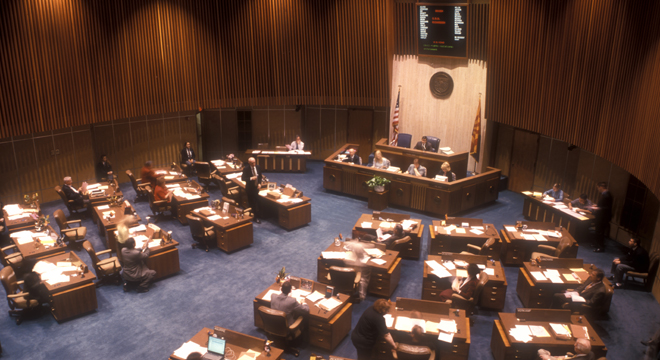With a sweeping series of bills introduced Monday night in the state Senate, Republicans in Arizona hoped to make Wisconsin’s battle against public unions last year look like a lightweight sparring match.
The bills include a total ban on collective bargaining for Arizona’s public employees, including at the city and county levels. The move would outpace even the tough bargaining restrictions enacted in Wisconsin in 2011 that led to massive union protests and a Democratic effort to recall Republican Gov. Scott Walker.
“At first glance, it looks like an all out assault on the right of workers to organize,” Senate Minority Leader David Schapira (D) told TPM on Tuesday. “And to me, that’s a serious problem.”
The bills were crafted with the help of the Goldwater Institute, a powerful conservative think tank in Phoenix that flew Walker to the state for an event in November. Nick Dranias, director of the institute’s Center for Constitutional Government, told TPM he sees Walker as a “hero” but that Wisconsin’s laws were “modest” compared to Arizona’s measures.
“In Arizona, we believe that the political will exists to do even more comprehensive reform,” Dranias said. “The environment, the climate that we face in Arizona is much more receptive to these kinds of reforms than Wisconsin is.”
Beyond a ban on collective bargaining, the bills would also prohibit state and local government workers from deducting money from their paychecks to pay union dues.
They would ban state and local governments from paying anyone to spend time doing union work, a practice known as “release time.”
And in another break from the Wisconsin model, the restrictions would affect every type of public union, including police and firefighters.
Arizona is a right-to-work state, which gives unions a much smaller role there than in states like Wisconsin. But laws still currently give labor groups a place at the bargaining table to negotiate pay and other benefits for their members. All of that would change under the proposed rules.
Schapira, who is also running for Congress this year, said he expects the laws to easily pass unless something major happens. Democrats in the Senate are outnumbered 21-9, so he said there isn’t much they can do to stop the bills on their own.
“I think it’s kind of an all-hands-on-deck thing,” Schapira said. “We’ve got to get people down here at the Capitol to talk to their legislators, to contact them by phone or email and if need be to actually spend a significant amount of time here protesting these bills.”
The restrictions are on top of a proposal that Gov. Jan Brewer made earlier this month, saying she would offer state employees their first pay raise in years in exchange for giving up certain protections.
In light of that, Dranias said he expects the governor to be supportive of the new bills. The governor’s office did not return a message seeking comment. Sen. Rick Murphy (R), who introduced three of the four bills, also could not be reached for comment.
Dranias said the measures were inspired by Wisconsin but were more modeled after legislation passed in Virginia about 30 years ago. He said the goal of the measures wasn’t to ban public unions from Arizona but to make them seem obsolete.
“Gradually this would cause people to leave the unions as they recognized that unions no longer have an unfair bargaining advantage given to them by collective bargaining laws,” Dranias said. “They’ll realize that unions don’t do much for them.”
He said the institute has told Arizona’s legislators the state will save as much as $550 million a year if they put an end to collective bargaining.






